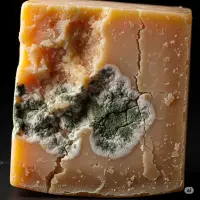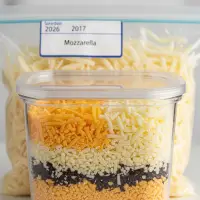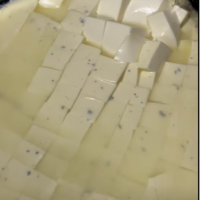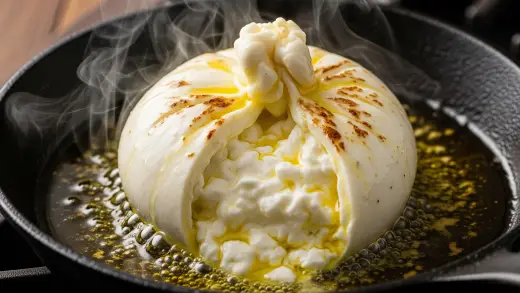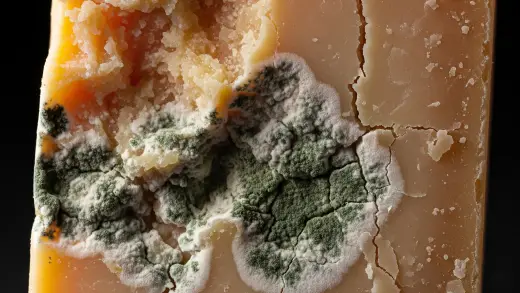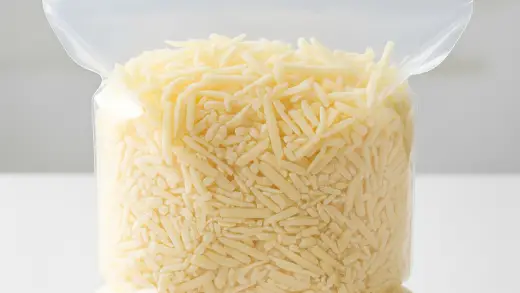No, it’s not safe to eat out-of-date mozzarella cheese. The expiration date is there for a reason, and consuming expired mozzarella can lead to foodborne illnesses due to bacteria and mold growth. Always check for signs of spoilage like mold, off smell, or changes in texture before consuming cheese.
Introduction
Mozzarella, with its creamy texture and mild flavor, is a beloved staple in many households. Whether you’re making a classic Caprese salad or a gooey pizza, mozzarella can elevate any dish.
But what happens when you find that forgotten block of mozzarella in the back of your fridge past its expiration date? For health-conscious individuals, food enthusiasts, and busy professionals, understanding when it’s safe to eat out-of-date mozzarella is crucial for both enjoyment and safety.
In this article, we’ll explore the nuances of expiration dates, signs of spoilage, and how to handle mozzarella safely.

What is Mozzarella Cheese?
Mozzarella originated in Italy and is known for its soft, moist texture. It’s traditionally made from the milk of Italian water buffaloes, though cow’s milk is often used in modern production.
The cheese is typically white but can turn slightly yellow depending on the animal’s diet. Mozzarella’s mild flavor makes it versatile in a variety of dishes, from salads to sandwiches.
For many, mozzarella is a go-to cheese, thanks to its ability to melt beautifully. This quality makes it ideal for pizzas and pasta dishes.
However, like all dairy products, mozzarella has a shelf life, which can be a concern for those worried about food safety. Understanding the intricacies of expiration dates can help you enjoy this cheese without compromising your health.
The importance of food safety cannot be overstated. Consuming spoiled cheese can lead to foodborne illnesses, which is why it’s important to understand the indicators of freshness. In the following sections, we’ll break down how to interpret expiration dates and recognize signs of spoiled mozzarella.
Understanding Expiration Dates
When it comes to food packaging, terms like “best before,” “use by,” and “sell by” can be confusing. Let’s clarify what each of these means to help you make informed decisions about mozzarella and other perishable foods.
What Do “Best Before” and “Use By” Dates Mean?
“Best before” dates indicate the period during which the product maintains its highest quality. Consuming mozzarella after this date might not pose a health risk, but the cheese’s taste and texture may be compromised. Conversely, “use by” dates are stricter, indicating the last day the product is considered safe to eat. Adhering to these guidelines is crucial for maintaining food safety.
Differences Between Sell-by, Use-by, and Best-before Dates
- Sell-by Date: This is a guide for retailers to know how long a product should be displayed for sale. It’s not directly related to safety.
- Use-by Date: This is the last date recommended for the use of the product while at peak quality. Beyond this date, the product’s safety is no longer guaranteed.
- Best-before Date: Indicates when a product is expected to remain at peak quality. It is not a safety deadline.
Understanding these dates is essential for determining whether out-of-date mozzarella is still safe to eat. However, it’s not the only factor to consider. Visual and sensory cues also play a significant role in assessing freshness, as we’ll discuss next.
Signs of Spoiled Mozzarella
Identifying spoiled mozzarella isn’t just about checking the label—it’s also about using your senses. Here are some visual, olfactory, and taste indicators that your mozzarella may have gone bad:
Visual Cues
Mold is a clear sign that mozzarella is no longer safe to eat, especially if it’s blue or green. Discoloration, such as yellowing or browning, can also indicate spoilage. Additionally, if the cheese appears slimy or has a hard, cracked surface, it’s best to avoid consuming it.
Smell
Fresh mozzarella has a mild, milky aroma. If it starts to smell sour, rancid, or musty, it’s likely spoiled. Trust your nose—an off-putting smell is a strong indicator that the cheese has gone bad.
Taste
If the mozzarella tastes sour or has an unpleasant aftertaste, it’s best to discard it. While taste should be the last resort for checking freshness, it can confirm spoilage when other signs are present.
By paying attention to these cues, you can avoid the risks associated with eating expired mozzarella. But are there any scenarios where it might still be safe to consume? Let’s explore this further.
Can You Eat Out-of-Date Mozzarella?
Eating out-of-date mozzarella can pose health risks, primarily due to the potential growth of harmful bacteria like Listeria or Salmonella. These can cause foodborne illnesses with symptoms such as nausea, vomiting, and diarrhea. Therefore, caution is advised when considering eating expired cheese.
That said, there are scenarios where out-of-date mozzarella might still be safe. If the cheese is unopened, stored under optimal conditions, and shows no signs of spoilage, it may still be consumable a few days past the expiration date. However, it’s important to use your judgment and rely on visual and sensory cues.
Refrigeration plays a crucial role in extending the shelf life of mozzarella. Keeping the cheese at a consistent, cold temperature can slow bacterial growth and maintain its quality for longer. In the next section, we’ll discuss how to store mozzarella properly.
Proper Storage of Mozzarella
To maximize the shelf life of mozzarella, proper storage is key. Here are some tips for both fresh and packaged varieties:
Fresh Mozzarella
Store fresh mozzarella in its liquid brine and keep it refrigerated in an airtight container. This helps maintain its moisture and flavor. If you’ve opened the packaging, change the brine every couple of days.
Packaged Mozzarella
Store unopened packages in the refrigerator. Once opened, wrap the cheese tightly in plastic wrap or place it in an airtight container to prevent exposure to air and moisture.
Freezing
Mozzarella can be frozen to extend its shelf life, although it may affect the texture. Wrap it tightly in plastic wrap and then in aluminum foil before placing it in the freezer. Thaw in the refrigerator before use.
By following these storage tips, you can keep your mozzarella fresher for longer, minimizing waste and ensuring you always have delicious cheese on hand. But what should you do with mozzarella that’s past its prime? Let’s explore some options.

What to Do with Expired Mozzarella
If your mozzarella is past its expiration date and shows signs of spoilage, it’s best to dispose of it safely. Here’s how you can handle expired cheese:
Safe Disposal
Place the spoiled cheese in a sealed bag or container before disposing of it in the trash. This prevents odors and contamination and helps keep pests away.
Composting
While mozzarella can be composted, it’s best done in a controlled environment like a compost bin. Dairy products can attract pests, so it’s crucial to balance your compost with plenty of brown materials (like leaves or paper) to maintain a healthy compost environment.
Taking these steps ensures that spoiled mozzarella is dealt with responsibly. However, prevention is better than cure, and proper storage can save you from having to dispose of cheese. Let’s wrap up with a few final thoughts on mozzarella safety.
FAQs
How Long Does Mozzarella Last Out?
Unrefrigerated mozzarella should be consumed within 2 hours to prevent bacterial growth. Always refrigerate promptly.
What Is the Shelf Life of Processed Mozzarella Cheese?
Processed mozzarella generally lasts longer than fresh, with a shelf life of about 1-2 weeks after opening when refrigerated properly.
Can I Eat 1 Year Expired Cheese?
It’s not advisable to eat cheese that’s expired by a year, as it poses significant health risks. Always check for spoilage signs before considering consumption.
How Long Does Mozzarella Last After Use By Date?
Unopened mozzarella can last up to a week past its use-by date if stored properly. Opened mozzarella should be consumed as close to the use-by date as possible.
How Do You Know if Mozzarella Has Gone Bad?
Check for mold, changes in color or texture, and any off smells. If in doubt, it’s safer to discard it.
Conclusion
When it comes to mozzarella, always prioritize food safety. While some expired cheeses may still be consumable, recognizing spoilage signs and understanding expiration dates are key to making informed decisions.
For those eager to explore more about cheese varieties, including vegan options, consider reading What is Vegan Mozzarella Cheese Made of or learn how to make a delicious Grilled Cheese Sandwich with Mozzarella.
Remember, when in doubt, it’s better to err on the side of caution and discard any questionable mozzarella. Your health and well-being are worth it!





